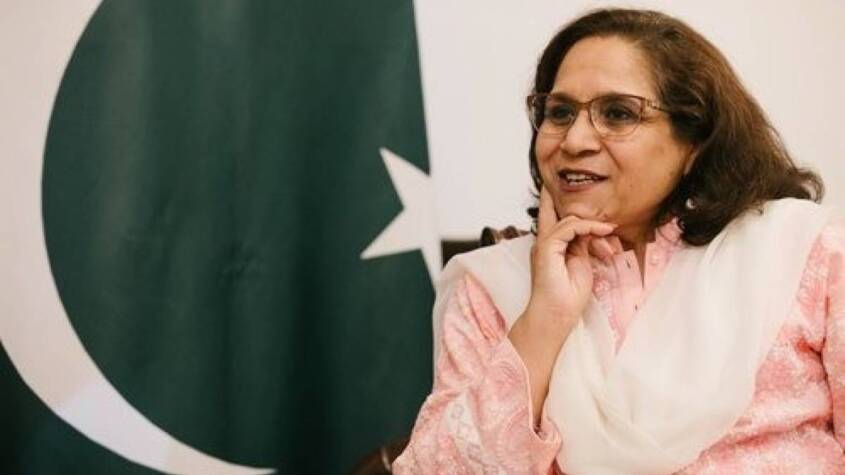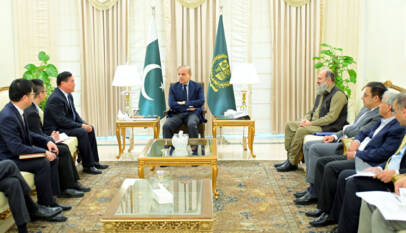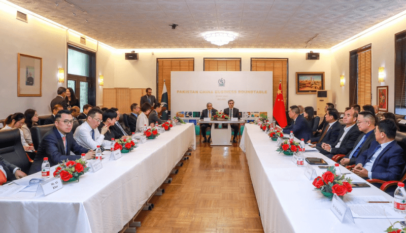Ambassador Naghmana lauds China for the successful conduct of Winter Olympics
Ambassador Naghmana Hashmi, Pakistan’s former ambassador to China, EU & Ireland writes that the speed of the rising of China has basically altered rules of interstate engagement not only for the developing world including the US and Europe. She highlighted that China is a prime example of geo-economic tools being put to actual use for enhancing geopolitical and geostrategic gains in the region and beyond. Similarly, China’s BRI and its flagship project CPEC are exactly in line with this new trend. She mentioned that the U.S.A Strategic Competition Act 2021 was passed by the US parliamentarians that include actions not only to address the economic competition with China, but also humanitarian and democratic values, such as imposing sanctions over the treatment of the minority Muslim Uighurs and supporting democracy in Hong Kong. Ambassador Naghmana added that the diplomatic boycott by the western world of the Beijing Winter Olympics clearly demonstrated that shifting the gear or focus from Geo-politics to geo-economics.
THE phenomenal strength and speed of rise of China has fundamentally altered rules of interstate engagement not only for developing world but also for the developed and politically established powers including the US and Europe.
With its strong and sustained economic power which gives it the requisite strength to pursue its geopolitical and geostrategic agenda, China’s political outreach has increased manifold.
2. China is a prime example of geo-economic tools being put to effective use for protecting and enhancing geopolitical and geostrategic gains in the region and beyond.
The significance of geo-economics therefore, as an effective and preferred instrument to achieve geopolitical and geostrategic goals has established itself in a fast changing world.
China’s Belt and Road Initiative, of which the Pakistan-China Economic Corridor (CPEC) is the flagship project, is exactly in line with this new trend. China today has emerged as a strong and an effective practitioner of this evolving trend
3. While China is set to overtake the USA as the largest economy in the coming years, Brazil and India among BRIC nations have suffered due to COVID 19, particularly India where the inability and inefficiency of the Modi government has seriously questioned the economic and political stability of India, delaying if not diminishing its chances of emerging as one of the pillars of multipolar world in the near future.
The U.S.A on its part is trying new strategies and alliances to contain China and retard if not limit its growing influence in the region and beyond that has given rise to concepts of Indo-Pacific as a political and security construct and alliances like QUAD and ANGUS, heralding in uncertainties and insecurities particularly in our region and sparking fears of new cold war.
4. In this state of uncertainty and geopolitical flux, the U.S.A Strategic Competition Act 2021 was passed by the US parliamentarians that includes measures not only to address the economic competition with China, but also humanitarian and democratic values, such as imposing sanctions over the treatment of the minority Muslim Uighurs and supporting democracy in Hong Kong.
The bill seeks to counter the expanding global influence of the People’s Republic of China by formalizing the policy objective of the United States to “sustain its global leadership role” and declaring that the Chinese government is leveraging its political, diplomatic, economic, military, technological and ideological power to compete with the United States on a global stage.
5. On the other hand, globalization has increased the interdependence of sovereign states. In this new world of trade and supply chains, scientific and technological advances, demographic shifts and migration issues due to economic reasons; and new alignments among Asian, African and Southern and Central American countries, the emergence of strong trading blocs, stringent financial laws, intellectual property rights etc. are apparently making the use of economic power more effective and relevant.
6. In today’s economically inter-dependent world therefore, the use of geo-economic tools including targeted sanctions by developed countries on a variety of pretext including human rights and environmental concerns, are becoming more effective.
In recent decades we have seen geo-economics tools being increasingly put into practice for protecting and enhancing geopolitical and geostrategic interests. US sanctions against Iran, Pakistan, North Korea, Venezuela, China, etc are all examples of economic pressure employed for geopolitical gains.
7. Many scholars of world politics believe that the emerging trend of geo-economics, particularly its actual practice by China, is questioning the political and governance models in vogue in the Western world.
They believe that President Xi’s model is not only propagating a geo-economic order as an alternative to neo-liberalism but also offers a political alternative to liberal democracy.
China advocates a diverse and multipolar world—a balance of power among large regional blocks that would prevent any single one of them from dominating the emerging world order.
8. COVID 19 pandemic has added another dimension and has further challenged the standard tools of geopolitics.
There is no example of a pandemic that has put the political and governance systems of states, their administrative capabilities, and their economic fundamentals, the strength of their health infrastructure, the resilience and discipline of the people as COVID 19.
Here again we saw how the economic strength, superb governance capabilities, agility of the enterprises and organizations to quickly adapt to new challenges and requirement, the faith and trust of the people in the leadership and tremendous national discipline, among other factors, helped China not only survive the pandemic but scuttle the brutal attempts to alienate, stigmatize and malign it. In contrast 2020-2021 clearly brought to the fore the inequalities, lack of clarity and financial and governance capabilities of developed world of liberal democracies.
We saw how one developed country after another descended into political, economic and governance chaos questioning the effectiveness of the liberal democracies in times of great emergencies
9. China on the other hand successfully used its economic and production strength to emerge as the world leader in provision of COVID related PPEs and ventilators amassing good will from around the world particularly in the developing world struggling to cope with the pandemic.
The expeditious development and distribution of COVID vaccine around the world also exhibited the strength of the political, economic, governance and administrative capabilities of China. It would therefore not be an exaggeration to say that put its geo-economics ‘COVID diplomacy’ to superb use to protect geopolitical interests.
10. The diplomatic boycott of the Winter Beijing Olympics by the U.S.A and its Western allies is a practical manifestation of the changing geo-strategic and geo-economic orientation and an effort by the Western block to challenge China in all spheres of activity in an effort to delay if not to stop the certain rise and rejuvenation of China by 2049 when it marks the 100 years of the establishment of the people’s republic of China.
Pakistan made a principled decision to participate in the Winter Olympics and Prime Minister sent a strong and unequivocal signal that Pakistan was not for the politicization of sports and that Pakistan stood firmly with its time-tested, All Weather Strategic Cooperative Partner and Iron brother China.
11. The visit also provided an excellent opportunity to exchange views on the important global, regional bilateral developments and chart out a clear direction for the further strengthening of the bilateral relationship in all spheres.
With a strong emphasis on economic cooperation and investments, the visit put an end to speculations that CPEC was getting slow or that there was some kind of a cooling of relations between the two iron brothers.
12. The diplomatic boycott by the western world of the Beijing Winter Olympics clearly demonstrated that shifting the gear or focus from Geo-politics to geo-economics as a tactic does not necessarily mean changing or compromising national interest goals.
It only means changing the tools from hard military power to achieve the same geopolitical goals through applying geo economic tools. It however, remains to be seen whether the system being spearheaded by China will be successful or the world would revert to hard military prowess.
Ambassador Zaidong highlights China’s embrace of innovation for sustainable development in Pakistan partnership
In recent months, the term “new quality productive forces” has sparked intense discussions…










